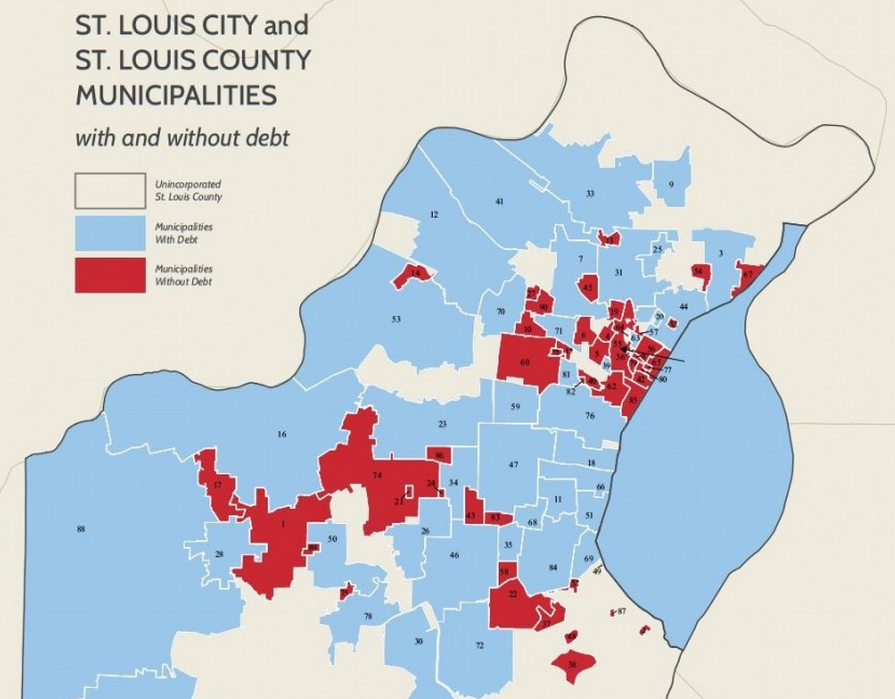Connecting state and local government leaders
Many of the problems plaguing Ferguson and other St. Louis suburbs stem from the 'Great Divorce.'
"We're in a fight for our lives on the world stage," said St. Louis County Executive Charlie A. Dooley during a recent gathering of leaders. He wasn't talking about the situation in Ferguson, which hadn't yet happened. Although he didn't know it then, Dooley was talking about the steps that Missouri leaders might have taken months, years, even decades ago to prevent the crisis in Ferguson today.
Dooley uttered those words back in February, at an annual symposium convened at Saint Louis University. The subject of the conference was reunification: the municipal consolidation of St. Louis City and St. Louis County. The division between the two municipalities has emerged as an unlikely subject of scrutiny following the tragic death of Michael Brown. The unarmed black 18-year-old was shot to death by white Ferguson police officer on Aug. 9, and police and demonstrators have been locked in conflict ever since.
St. Louis City broke off from St. Louis County almost 150 years ago in what is today known as the Great Divorce. In a thoughtful editorial for The New York Times, New School urban policy professor and former Missouri state senator Jeff Smith explained how many of the problems plaguing Ferguson and other St. Louis suburbs all stem from this original sin.

(A Spofford's Atlas map of St. Louis city from 1900. Jim Pruitt via Shutterstock.com)
Today, St. Louis County comprises 91 municipalities (including a large unincorporated area), a fragmented region that has resulted in fewer representative municipal governments, weaker and less ambitious municipal leaders, and more towns that depend on court fees for their survival. (And police departments that survive on traffic stops). It's not difficult to trace all of these factors in Ferguson, both before and after Brown's death.
Dooley was looking ahead, and he was right: The crisis unfolding in Ferguson affects all of St. Louis. Even before Brown's death precipitated a national conversation about it, reunification was necessary. At this point, the conversation needs to stop. Missouri should follow one of the most successful examples of municipal consolidation in history—that of Indianapolis—and marry St. Louis City and County by the power vested in the state of Missouri.
While people are calling for President Barack Obama to personally involve himself in Ferguson, the person who is badly needed now is Dick Lugar. The former Indiana senator and mayor of Indianapolis was key to the implementation of Unigov. That's the system by which Indianapolis and Marion County—which went their separate ways in the 19th century, not unlike St. Louis City and County—were reconciled in the 1960s. Unigov might be the very best model for restoring confidence in local government in Ferguson (and St. Louis more broadly), even if it would do so by circumventing both city and county.
Unigov was a unique solution to a familiar problem. Although it was spearheaded by then-Mayor Lugar (along with Beurt SerVaas and other key figures), the bill that expanded Indianapolis to the borders of Marion County was passed by the Indiana state legislature. Bypassing residents and referenda, Unigov catapulted Indianapolis into the ranks of the largest cities in the nation when it passed in 1970. The lawmakers who designed Unigov legislation also provided in advance for the future municipal consolidation of cities in Indiana that grew above a certain size (although this feature was later dropped).
Historically, the alternative path to municipal consolidation—via the vote—has mostly ended in failure. According to the National Association of Counties, the great majority of efforts to consolidate municipal authority since 1805 have not succeeded. Only 27 of the 105 merger referendums put forward across the nation between 1902 and 2000 passed. The 2003 merger between Louisville and surrounding Jefferson County in Kentucky only passed after multiple failures spanning decades.
One of the defining features of St. Louis' Great Divorce is that both parties have been talking about getting back together for years—decades, even. As a spirited March 2014 article in St. Louis magazine proves, the terms of the debate are not that much changed. (Maybe the civic debate is a little tamer today. "I maintain that if this merger goes through, we won’t have a situation where a murderer and gangster like Dinty Colbeck could exercise approximately as much power as the sheriffs and constables," pledged then-St. Louis Mayor Victor J. Miller, pleading for a city-county merger during Prohibition.)
Back in Miller's day, in 1926, a city-county merger in St. Louis might have brought high schools and sewers for African American districts, as the article goes on to explain. No wonder the vote failed (2 to 1 in the county, 7 to 1 in the city). Today, of course, St. Louis County municipalities aren't organizing and incorporating as a way to keep black residents out. But African Americans living in St. Louis might as well be living in a different universe.
As a major report on health outcomes produced earlier this year by Washington University in St. Louis and Saint Louis University shows, the disparity in access to health and education between blacks and whites in the St. Louis region is severe. By almost any metric measuring health outcomes, across the region, African Americans trail behind whites. In 2011, the costs to both St. Louis City and County due to early loss of life among African American residents totaled $3.3 billion—billion with a B. This figure will only rise as blacks gain on whites demographically (their numbers increased 5 percent in the region from 2000 to 2010, fueled by growth in the county).
Less dramatic figures put together by Better Together, an advocacy group that supports reconciliation, show that St. Louis pays more for its services than consolidated cities like Indianapolis and Louisville. Indianapolis pays $1,328 per capita for government services, for example, while the St. Louis region spends $1,918 for these services (44 percent more). Black residents in the Lou are paying more and getting far less.

(Washington University in St. Louis/Saint Louis University)
The goal is not to turn St. Louis into Indianapolis, where critics say that Lugar used Unigov to build a machine to pump out GOP pols in Indianapolis as other Rust Belt cities elected black mayors. (They pretty much say the same thingabout efforts to tweak Unigov today.) Not everyone agrees on the savings to be had in streamlining government and eliminating duplicative services, or believes that the savings are worth the costs. Indianapolis has its own problems. But consolidation would at the very least knock down some of the structural barriers that prevent black residents in St. Louis County from succeeding.
There is a mechanism in the Missouri Constitution for reverting St. Louis City into St. Louis County through a system called "re-entry," but it doesn't go far enough to address the problems of St. Louis County. A local vote for a full merger has next to no hope of passing, since it would in all likelihood require the county's municipal governments to vote themselves out of existence. The advantage to using the statewide ballot or state legislature to merge St. Louis City and St. Louis County is that it bypasses these micro-governments—"fiefdoms," the St. Louis Post-Dispatch calls them, in an editorial recommending a total merger.
It doesn't sound very democratic to give the residents of Kansas City and Columbia a say in what happens in St. Louis and Ferguson. But then again, the residents of Ferguson hardly have a say in what happens in Ferguson: Research shows the city is a serious outlier in terms of its representational gap between black residents and white authorities (both elected leaders and police). The residents are majority black, the authorities are overwhelmingly white, and, well, we see how well things are working out.
In other St. Louis County municipalities, the situation is even more intolerable, structurally speaking. At the Saint Louis University convention in February, former Urban League St. Louis head (and Better Together board member) Jim Buford demonstrated that 49 of 90 municipalities do not have any debt. Which sounds nice. Some of those are well-to-do cities, and good for them. But the majority are predominantly small, African American communities in North County where poverty has flourished. These are cities with no access to debt.

(Better Together)
Buford's presentation is eloquent; it is tempting to quote him at length. Here is a key passage about what it means that so many St. Louis County municipalities are "debt-free":
We’ve long known that individuals in poor communities were shut out of traditional credit markets and are often forced to turn to alternate sources of capital. Go to any impoverished neighborhood in the area, and you will find an abundance of alternative “financial institutions.” Places like payday loan stores, pawn shops, title loan stores or check-cashing shops—all of which charge exorbitant rates and fees to access much-needed capital. This is no secret. However, what we didn’t realize was that it’s not just individuals who are shut out of traditional markets. In many municipalities without debt, the entire community is also shut out of traditional markets, with even fewer places to turn for capital to reinvest.
Since the people in St. Louis County who benefit from the status quo are unlikely to vote in the regulations that would put themselves out of power, the pressure has to come from the state level. Naturally enough, it's County residents, not City residents, who oppose the merger. The Post-Dispatch reported late last year on a poll that registered strong support for a full merger among St. Louis City voters (77 percent) and decent support among voters statewide (43 percent), but low support at the county level (39 percent).
"Fragmentation serves as a structural impediment to community reinvestment," Buford said in his statement. "Neither our infrastructure nor our collective conscience can afford this current level of fragmentation."
Governor Jay Nixon has deployed the National Guard to Ferguson for still more arrests and tear gas. But to bring lasting change—loathe though I am to say it—it's time to mobilize the lawyers, the accountants, the lobbyists. Or, put in a better light, the reformers. The bitter Great Divorce has lasted long enough. If officials in St. Louis County can't muster the political will to implement reform, then they need to be relieved of duty.
(Top image by KENNY TONG / Shutterstock.com)



